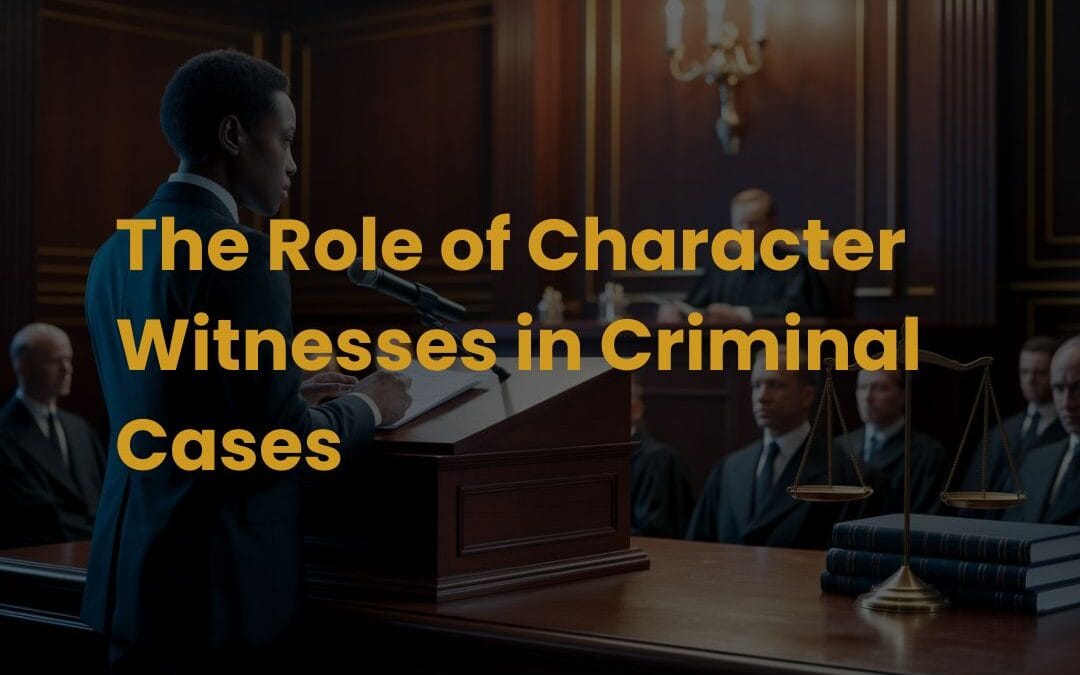When facing criminal charges, every piece of evidence matters, including testimony from individuals who can vouch for your character. Character witnesses play a crucial role in influencing the perception of the court by providing insights into a defendant’s behavior, reputation, and moral standing.
Page Contents
What is a Character Witness?
A character witness is someone who testifies about a defendant’s personal qualities, reputation, and behavior. Unlike an eyewitness, who provides details about the crime itself, a character witness offers testimony about the accused’s integrity and past actions to establish credibility and mitigate potential biases.
When Are Character Witnesses Used in Criminal Cases?
Character witnesses are commonly used in various stages of criminal proceedings, including:
- Bail Hearings: To demonstrate that the accused is a responsible individual unlikely to flee.
- Trial Proceedings: To establish the defendant’s reputation and moral character.
- Sentencing Hearings: To appeal for leniency by showcasing the defendant’s positive contributions to society.
Who Can Be a Character Witness?
A strong character witness should be someone who knows the defendant well and has firsthand experience with their behavior. Common character witnesses include:
- Family Members – Can attest to the defendant’s personal values and history.
- Friends and Colleagues – Can speak about the accused’s integrity and work ethic.
- Employers – Can vouch for the defendant’s responsibility and professionalism.
- Religious or Community Leaders – Can highlight the defendant’s role in the community.
How a Character Witness Can Influence a Case
Building Credibility
A credible character witness can help establish the defendant’s positive reputation, making it harder for the prosecution to depict them as someone likely to commit a crime.
Humanizing the Defendant
Testimony from someone who knows the accused personally can help the judge or jury see them as a person rather than just a defendant facing charges.
Mitigating Sentencing
In cases where a guilty verdict is likely, a character witness can help argue for a more lenient sentence by demonstrating the defendant’s remorse and potential for rehabilitation.
What Makes a Good Character Witness?
To be effective, a character witness should:
- Be credible and have a strong personal or professional connection to the defendant.
- Have no criminal record or any reason for bias.
- Communicate clearly and confidently in court.
- Provide honest, specific, and relevant information about the defendant’s character.
Potential Challenges of Character Witness Testimony
While character witnesses can be valuable, they may also be subject to cross-examination. The prosecution may attempt to:
- Discredit the witness’s testimony by questioning their knowledge of the defendant’s past.
- Expose potential biases if the witness has a close personal relationship with the accused.
- Introduce contradictory evidence that challenges the witness’s claims.
Legal Considerations for Using Character Witnesses
Rules of Admissibility
Not all character witness testimony is allowed in court. The defense must prove that the witness’s testimony is relevant and credible.
Restrictions on Prior Bad Acts
If a character witness testifies about a defendant’s good character, the prosecution may introduce prior bad acts or criminal history to counter their claims.
Federal vs. State Laws
Laws regarding character witness testimony vary by jurisdiction. Some states have stricter rules on what can be introduced in court.
How to Prepare a Character Witness for Court
- Educate them about the case: Ensure they understand the charges and their role in court.
- Practice questioning: Help them prepare for both direct and cross-examination.
- Encourage honesty: A witness should never exaggerate or fabricate information.
- Ensure professionalism: The witness should dress appropriately and remain composed while testifying.
Alternatives to Character Witness Testimony
If a live witness cannot testify, alternatives include:
- Written Statements – Letters from employers, community leaders, or religious figures.
- Video Testimonials – Recorded statements from friends and colleagues.
- Community Involvement Records – Proof of charitable work or positive social contributions.
Final Thoughts: The Impact of a Character Witness in a Criminal Case
Character witnesses can play a significant role in shaping court perceptions and influencing legal outcomes. Selecting credible witnesses and preparing them effectively can strengthen a defense strategy. However, it is essential to work with an experienced criminal defense attorney to ensure character witness testimony is used strategically and effectively.
Need Legal Assistance? Contact a Criminal Defense Attorney Today!
If you are facing criminal charges and need help building a strong defense, consult an experienced attorney. The right legal representation can guide you through the process and ensure you have the best possible defense.
📞 Call Hallinan Law Firm now at (415) 837-3449 for a confidential consultation.

